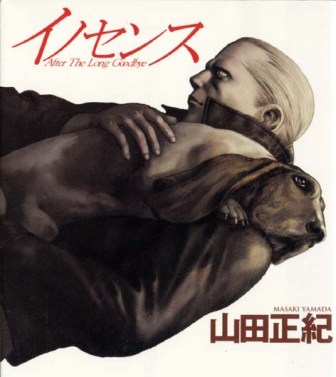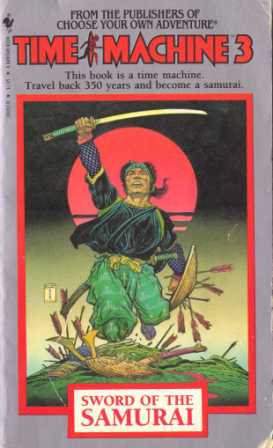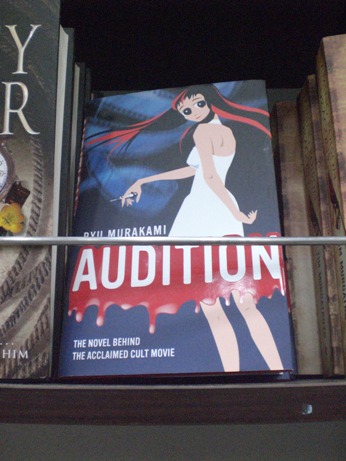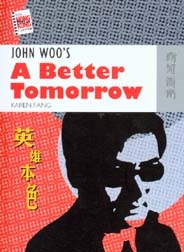|
|
| |
|
 Musings from the Edge of Forever
Musings from the Edge of Forever
Note: This blog expresses only the opinions of the blog owner,
and does not represent the opinion of any organization or blog
that is associated with RONIN ON EMPTY.
|
|
Archive for the ‘Books’ Category
Thursday, February 3rd, 2011
 A few years ago, I had mapped out rough drafts of reviews for Ghost in the Shell, Ghost in the Shell 2: Innocence, and Ghost in the Shell: S.A.C. Solid State Society with the intention of possibly even tackling a critique of the first season of Ghost in the Shell: Stand Alone Complex. Unfortunately, I didn’t back any of those files up, so those reviews died along with my Compaq’s hard drive. Someday, I hope to revisit at least one of those films and maybe even write a review, but until that day, perhaps I can at least “atone” for their disappearance with this mini-review of Masaki Yamada’s After the Long Goodbye, a literary prequel of sorts to Ghost in the Shell 2: Innocence. A few years ago, I had mapped out rough drafts of reviews for Ghost in the Shell, Ghost in the Shell 2: Innocence, and Ghost in the Shell: S.A.C. Solid State Society with the intention of possibly even tackling a critique of the first season of Ghost in the Shell: Stand Alone Complex. Unfortunately, I didn’t back any of those files up, so those reviews died along with my Compaq’s hard drive. Someday, I hope to revisit at least one of those films and maybe even write a review, but until that day, perhaps I can at least “atone” for their disappearance with this mini-review of Masaki Yamada’s After the Long Goodbye, a literary prequel of sorts to Ghost in the Shell 2: Innocence.
Perhaps in a bid to stave off a nervous breakdown, I’ve been trying to read things from my collection that have nothing to do with my dissertation. After all, it’s about time I catch up on the many, many books that adorn my shelves, but have yet to be cracked open. One such book is the aforementioned After the Long Goodbye, which was purchased at the height of my interest in the popular Ghost in the Shell franchise.
First published in Japan in 2004 and later translated by Yuji Oniki and Carl Gustav Horn for publication by Viz Media in 2005, the novel takes place shortly before the events of GITS 2: Innocence, and is told from the perspective of Batou, the primary male character in the Ghost in the Shell franchise. A soulful cyborg working for the counter-terrorist task force known as Section 9, Batou still carries a torch for Major Motoko Kusanagi, his female superior officer and, as I interpret it, his unrequited love. I would explain what happened to Motoko in the first movie, but I don’t have all day.
(more…)
Posted in Ghost in the Shell, Japanese Literature, Books | 2 Comments »
Sunday, January 2nd, 2011

I’ll never forget the time I traveled back in time 350 years and met Miyamoto Musashi. I mean, wouldn’t you?
Okay, I recognize the above-written statement needs some explaining so let me just say that I neither own a DeLorean nor have I ever been committed to a mental health facility for extended psychiatric evaluation. All I did was read a book — imagine that? Now this text may not be a classic of children’s literature, but it was one that I look back on as a real gateway to an interest in reading, science fiction, and Japanese culture, not to mention the book’s status as a text that helped shape my moral compass at such a very early age.
The book I am talking about is Sword of the Samurai, which was the third volume of the Time Machine series. The name may not ring any bells, but I’m betting you probably at least heard of its biggest competitor, Choose Your Own Adventure. Like its more popular predecessor, Time Machine allowed the reader to choose his or her next move. Written in the second-person point of view, the books give you a choice at the end of a chapter. In the case of Sword of the Samurai, the choice might be as simple as this:
*Warn Musashi. Turn to Page 84.
*Say Nothing. Turn to Page 81
(more…)
Posted in Time Machine, Miyamoto Musashi, Japanese Culture, Japanese cinema, Books | No Comments »
Saturday, October 10th, 2009

While visiting a bookstore in Singapore, I noticed that Ryu Murakami’s short novel, Audition, had finally been published in an English translation (NOTE: it ain’t coming out in the US ’till 2010!). The chilling tale was most famously (infamously?) adapted by Takashi Miike in 1999. You can read my largely positive review here. I can’t say that I cared much for Murakami’s In the Miso Soup or 69, but I liked Miike’s film quite a bit so I thought — what the heck! — I’d give the source text a chance. At a short 200 pages, I was able to read it in the space of a few hours while lounging in Singapore (instead of studying for my Qualifying Exams. Doh!). Here are some thoughts…
I would say that the novel is every bit as gripping as the film is. The movie, of course, has the added advantage of actually terrifying you with disturbing onscreen imagery (which also leads viewers to have a better sense of what might unfold in a way that the book doesn’t). Less influenced by the dream logic that pervades the film adaptation, Murakami’s novel “makes sense” in an intellectual way — everything, bizarre or not, is understandable and explained quite clearly. Admittedly, that doesn’t make it better or worse than the film, but it certainly makes for a very different experience from the more symbolic, nightmarish landscape that envelops the 1999 film.
Here’s the plot description that I gave for the film, minus the actor’s names:
Sparked by his teenage son’s encouragement, middle-aged widower and all-around swell guy Aoyama begins to look for a new wife. Upon the suggestion of his movie industry pal Yoshikawa, our hero agrees to take part in calling an audition for a new film, but with the ulterior motive of finding himself an “ideal woman.” Of the thirty young prospects, only one captures Aoyama’s interest - the beautiful, demure Asami. We’ve all seen enough She’s All That-inspired crap to guess what might happen next: the two lovebirds quickly fall for each other, but when Asami learns that the audition was a ruse, she dumps our protagonist. Naturally, Aoyama then spends the rest of the movie trying to win her back - which he does and the two marry. So in the end, Aoyama has a wife for himself and a mother for his son. Everybody’s happy. The end.Of course, that “educated guess” isn’t what happens AT ALL.
The first 168-pages detail the budding romance between middle-aged Aoyama and the younger Asami, and the remaining 32-pages deal with the ghoulish conclusion of said relationship. I have to say that I did prefer the film’s inclusion of a “detective story” plot that does much to energize the last act, an element which is sadly not present at all in the novel.
Still, the writing is great. Murakami’s characterization of the introspective Aoyama and his charming, all-too-wise teenage son, Shige, is reason enough to pick up the novel, that is– if you’re not too squeamish about horror. Further, the novel’s implicit commentary on patriarchy, sexism, and misogyny, not to mention it’s vivid exploration of the psychological toll of childhood trauma and abuse make this much more substantive than your average (Read: crappy) horror novel.
And so, a word or warning: the 32-page finale, which begins with a character reminiscing about a sexual liaison in a way that may be WAAAAAY too explicit for casual readers, quickly turns into a dizzying, Grand Guignol-style ordeal that was almost as difficult to read as it was to watch in the chilling film adaptation.
But if you can stomach it, Audition is still a damn good read.
Rating: 8 out of 10
Posted in Audition, Ryu Murakami, Books | 1 Comment »
Friday, May 1st, 2009
 
When I was attending the University of Hawai’i at Manoa, I did a keyword search of “Wong Kar-Wai,” and amongst the results, I was directed to a couple of HK cinema-related books that I had no idea existed. One was a booklength study of Ashes of Time by Wimal Dissanayake; the other was an equally extensive look at Happy Together by Jeremy Tambling. Both were extremely well-written, illuminating, and full of little known facts about the films. The idea that this would be an ongoing series was an exciting prospect for a Hong Kong cinema fan such as I.
When I visited Hong Kong a few years back, I picked up a copy of Karen Fang’s informative look at A Better Tomorrow at one of the museum gift shops, and just recently, I finished reading Gina Marchetti’s take on the Infernal Affairs Trilogy. She does a heckuva job keeping everything that goes on in the trilogy straight, teasing out the implications of new, seemingly contradictory information we receive in the two sequels. To date, these are the covers of all the books in the series, save Lisa Oldham-Stokes’ He’s a Woman, She’s a Man and Tony Williams’ A Bullet in the Head, which aren’t coming out until May.
(more…)
Posted in Books, Hong Kong cinema | 15 Comments »
|
|
|
| |
| |
|
|
|
|
|
|
|
|
|
|
|
|
|
|
|
|
|
|
|
|
|
|
|
|
|
|
|
|
|
|
|
|
|
|
|
|
|
|
|
|
|
|
|
|
|
|
|
|
|
|
|
| LoveHKFilm.com
Copyright © 2002-2026 Ross Chen |
|
|
 A few years ago, I had mapped out rough drafts of reviews for Ghost in the Shell, Ghost in the Shell 2: Innocence, and Ghost in the Shell: S.A.C. Solid State Society with the intention of possibly even tackling a critique of the first season of Ghost in the Shell: Stand Alone Complex. Unfortunately, I didn’t back any of those files up, so those reviews died along with my Compaq’s hard drive. Someday, I hope to revisit at least one of those films and maybe even write a review, but until that day, perhaps I can at least “atone” for their disappearance with this mini-review of Masaki Yamada’s After the Long Goodbye, a literary prequel of sorts to Ghost in the Shell 2: Innocence.
A few years ago, I had mapped out rough drafts of reviews for Ghost in the Shell, Ghost in the Shell 2: Innocence, and Ghost in the Shell: S.A.C. Solid State Society with the intention of possibly even tackling a critique of the first season of Ghost in the Shell: Stand Alone Complex. Unfortunately, I didn’t back any of those files up, so those reviews died along with my Compaq’s hard drive. Someday, I hope to revisit at least one of those films and maybe even write a review, but until that day, perhaps I can at least “atone” for their disappearance with this mini-review of Masaki Yamada’s After the Long Goodbye, a literary prequel of sorts to Ghost in the Shell 2: Innocence.



